
(The following is an expanded version of my 2010 review.) If I were pressed to list the creepiest horror movie ever made, Alan Parker’s Angel Heart (1987) would be at least close to the top of the list — and maybe at the very top. It has an atmosphere that seeps into your very bones. At the time of its release, the quality, mood and horror content of Parker’s film-noir take on the genre got a little lost in the controversy over its trouble getting an R rating and the prospect of a naked Lisa Bonet (a role her TV dad Bill Cosby urged her to take, noting that the TV series wouldn’t last forever). In fact, it had to lose two or three seconds (since restored) — mostly of Mickey Rourke’s heaving backside — to get that R. The silly fuss was really too bad, because Angel Heart is the modern horror film at its finest.
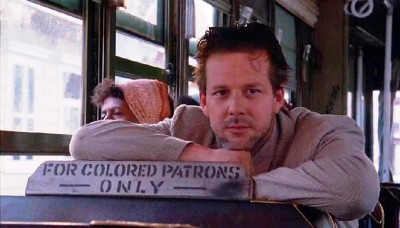
Parker took William Hjortsberg’s novel Falling Angel and transformed its efforts at creating a Raymond Chandler-style horror story into a much grander, broader and heavily symbolic film. Reading the book after you’ve seen the film (which I did), the book seems rather mundane, even though Parker follows the basic story and premise: Low-rent gumshoe, Harry Angel (Mickey Rourke), takes a job from one Louis Cyphre (Robert De Niro) to track down a missing big-band crooner, Johnny Favorite. Parker, however, takes the film in directions — and to locations — the book never goes. The book ultimately feels much more shallow and much more like a cheesy horror story. (Interestingly, however, Parker includes never-explained, but still disturbing, glimpses of a satanic bacchanal that is a central set-piece in the book.)
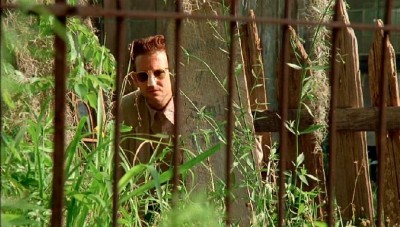
Originally, Angel Heart was promoted in filmic terms that linked it to William Friedkin’s The Exorcist (1973) and Roman Polanski’s Chinatown (1974). There’s some justification for the comparisons, but it’s probably closer in tone to Chinatown than The Exorcist, since everything about it centers on corruption, decay and fate (the last is constantly referenced in symbolic terms through shots of wheels or fan blades turning). There’s no comfort in religion in the world of Angel Heart. In fact, the film links a flashy Reverend Ike-styled ministry to voodoo, and fundamentalist religion is often glimpsed in the areas where diabolic doings are taking place. Plus, the film (and novel) even boasts a character, Ethan Krusemark (New Orleans stage actor Stocker Fontenlieu), who parallels John Huston’s Noah Cross in Chinatown. Moreover, Rourke spends a portion of the film hiding his (then) movie star looks behind an absurd nose-guard, inevitable recalling Jack Nicholson’s character in the Polanski film.
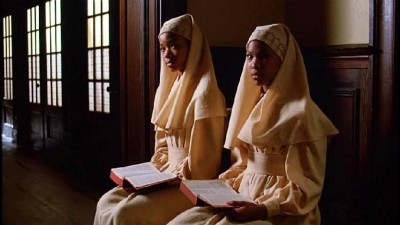
One of Parker’s biggest inspirations was to move the action from New York City to New Orleans part way through the film. This not only broadened the scope of the story, but it afforded the opportunity for the movie to go even deeper into its central preoccupation of creating an all-encompassing atmosphere. (For that matter, it also made the story even more like the pulp-fiction detective stories that influenced it, since the big-city detective sent into a foreign and hostile environment was a staple, e.g. Dashiell Hammett’s Red Harvest.) The period (1955) setting in New York is effectively seedy, but the New Orleans scenes are brilliant in their degeneracy.
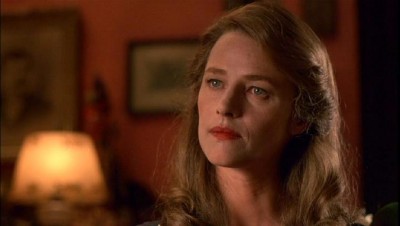
The novel was merely set in the 50s, the film makes that era and its locales into something deeply — almost tangibly — sinister. The aura of corruption is just beneath the surface of everything and every place, which makes the film also something of a companion piece to David Lynch’s Blue Velvet (1986), though that is probably unintentional. What is perhaps not unintentional is the fact that it comes across like a slap in the face to the political climate of the 1980s that tended to idealize the 1950s in ridiculously Disney-fied terms. There is certainly nothing idealized about Parker’s 1950s. They’re shabby, grubby and the racism of the era lurks around every corner.
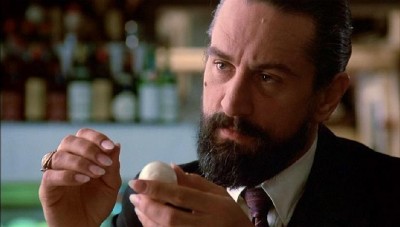
Despite having a large cast of odd — often disturbing — subordinate characters, the movie really belongs to a mere four people: Rourke, De Niro, Bonet (who is awkward but effective) and Charlotte Rampling. It’s always startling these days to see young Mickey Rourke, but his performance — funny, brash, cocky, tortured and with flashes of humanity — is so good that you get over it quickly. De Niro gets “special appearance” billing, but he’s really the co-star, and his silky, ambiguous villainy is astonishing. It probably helps that he gets the lion’s share of the good lines: “They say there’s just enough religion in the world to make men hate one another, but not enough to make them love,” “The future isn’t what it used to be,” “No one will mourn one less lawyer in the world,” and most tellingly, “However cleverly you sneak up on a mirror, your reflection always looks you straight in the eye.” The lines help, but his delivery and expressions sell them. It may, in fact, be De Niro’s most underrated performance.
Deeper implications aside, Angel Heart is first and foremost a horror film, and it never forgets that fact. Every scene has that atmosphere. A sense of evil and dread hangs over every moment, and all of it is beautifully accompanied by Trevor Jones’ score (which leans heavily on the 1920s Sunny Clapp pop song “Girl of my Dreams”). The film’s sound design alone is unnerving. All in all, the film is simply a remarkable work. (And, by the way, if anybody can identify the music that underscores the scene where Rourke discovers the dog tags — I feel fairly certain it’s from an opera — I would sure appreciate knowing what it is.)
The Thursday Horror Picture Show will screenAngel Heart Thursday, Feb. 20 at 8 p.m. in the Cinema Lounge at The Carolina Asheville and will be hosted by Xpress movie critics Ken Hanke and Justin Souther.


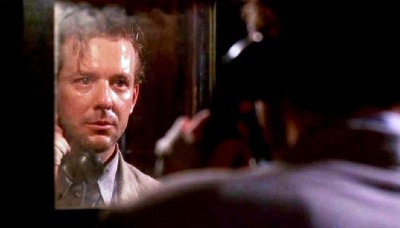
Before you comment
The comments section is here to provide a platform for civil dialogue on the issues we face together as a local community. Xpress is committed to offering this platform for all voices, but when the tone of the discussion gets nasty or strays off topic, we believe many people choose not to participate. Xpress editors are determined to moderate comments to ensure a constructive interchange is maintained. All comments judged not to be in keeping with the spirit of civil discourse will be removed and repeat violators will be banned. See here for our terms of service. Thank you for being part of this effort to promote respectful discussion.